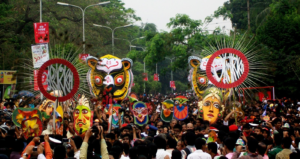Pohela Boishakh

Pohela Boishakh is the traditional New Year celebrated by Bengali people across Bangladesh, India and the world. The event takes place on the first day of the Lunisolar Bengali calendar, which on the Gregorian calendar, usually falls on April 14.
In 1966, the Bengali calendar was modified so that the first 5 months had 31 days and the rest in the year had 30 days. This change was made by Muhammad Shahidullah. From then on, New Year was celebrated from April 14.
Just as on the Gregorian New Year, we say “Happy New Year”, on Pohela Boishakh the traditional greeting is “Shubho Nabobarsho”, which literally translates to Happy New Year.
Historians speculate that Pohela Boishakh is related to Vaisakhi (and other names), another Hindu festival. Vaisakhi is an ancient harvest festival celebrated in the Punjab (North India) particularly.
Now-a-days, Pohela Boishakh is celebrated with enormous crowds gathering at fairs and treats being offered. Various food items and toys are given out to the people at these events. The most famous of these celebrations is “Mangal Shobhajatra”. Mangal Shobhajatra celebrates the pride that Bengalis have in their heritage, their courage to fight against evil and their vindication for truth and justice.
In 1989, a group of student of the Art school of Dhaka University (Bangladesh) started “Mangal Shobhajatra” with the idea of dances and performances with masks of various traditional things. This year elephants, tigers, birds and flowers were the focus of the celebration in Dhaka. For the first time, the neighbouring country, Kolkata (India), also celebrated “Mangal Shobhajatra” with the inspiration from Dhaka.
Bengalis across Australia also celebrate Pohela Boishakh traditionally. The biggest celebration of Pohela Boishakh in Australia took place in Sydney with traditional cultural programs and food. The dress code is mainly red and white saris and punjabis, and the foods include Ilish Bhaja and Panta Bhat (a fried fish with a rice dish), Jhal Muri (spicy rice puffs), Bhapa Pitha (a coconut based dessert) and Naru (a sweet coconut ball) just to name a few.
Pohela Boishakh is a huge celebration, so big that UNESCO decided to recognise it and claim it as the Intangible Cultural Heritage of Humanity. It invites all people across the world to celebrate. Every individual makes the celebration his or hers own. Regardless of race, age or gender, Pohela Boishakh is for everyone because it spreads a deep and strong message for a shared value of democracy.
Related Articles
বহে যায় দিন – সেই যে আমার নানান রঙের দিনগুলো
> বহে-যায়-দিন সকল প্রকাশিত পর্ব > ৷৷ তিন ৷৷ সেই যে আমার নানান রঙের দিনগুলো আশির দশকের মাঝামাঝি ক্যাপিট্যাল হিলের ওপর
বীরপ্রতীক ডাব্লু এস ওডারল্যান্ডের জন্মদিন আজ
ইতিহাস আর ইতিহাস বিকৃতি নিয়ে কত কথা কত ঝগড়া আমাদের। সব কিন্তু দলগত। আসলে যে ইতিহাস আমাদের জানা উচিত আমাদের
গৌলগঞ্জ, সাহেব আর রতন – হারিয়ে যাওয়া স্মৃতির নাম
আমরা বলতাম গৌলগঞ্জ। প্রকৃত নাম হতে পারে – গকুলগঞ্জ। গোপালগঞ্জ হলেও হতে পারে। প্রশন্নপুরের খিলা বাজারে আমাদের বাড়ি। সে খান








